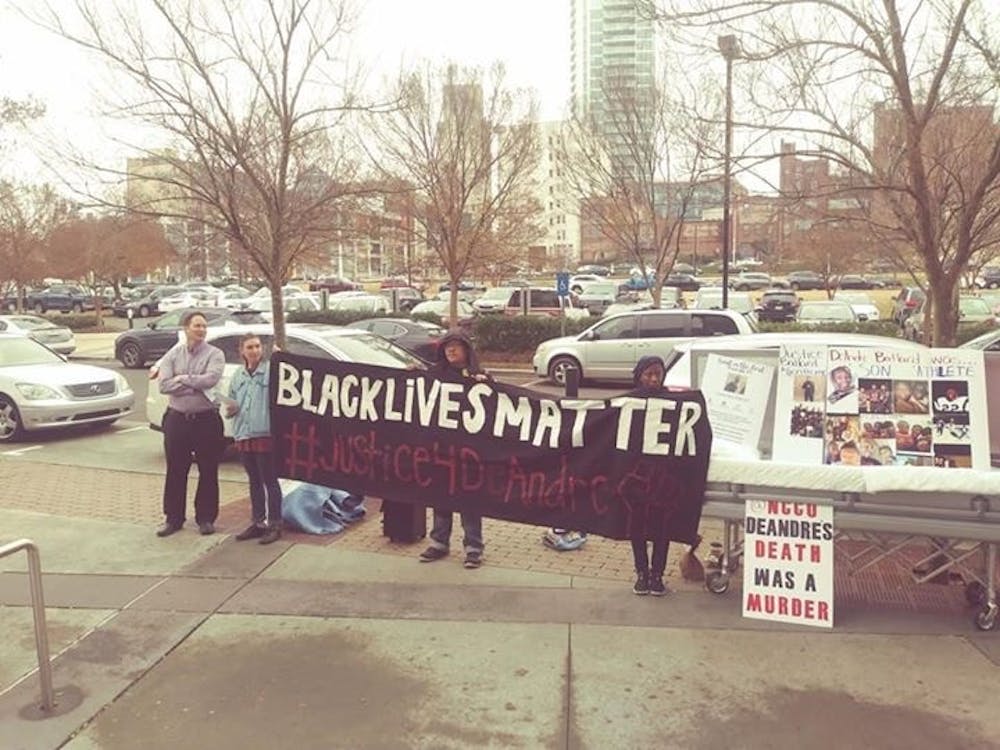In later statements to police, Mitchell said he exited his car once Ballard entered. He said Ballard shifted to the driver's seat, tried to turn on the car and then exited the car, putting his hands on him and making him fear for his safety. He said he drew his gun, pled with him and then shot him.
Ballard allegedly was barefoot, did not have a phone, keys or an ID on him. His family was not notified about his passing until three days later when the police department said his body was identified.
Dixon said he tries to imagine Ballard’s death unfolding as Mitchell described, but can't.
“He’s not even that type of person, not at all,” he said.
Chandler Powell Jr., a friend of Ballard’s from New Bern who went to NCCU with him, said the image of his friend presented by Mitchell is the complete opposite of the person he knew.
“I’m going to my grave knowing that that’s a lie,” he said.
Although the security officer was also Black, Bridgette Robinson, Ballard’s cousin and an NCCU alumna, said Black parents talk to their children about interactions with police officers regardless of their race.
“I know just from that standpoint, not even getting into his personality, he wasn’t going to openly engage someone who’s in a position of authority or who’s deputized or has a gun,” she said.
The Durham District Attorney’s office did not press charges against Mitchell. The DA’s office said in a statement the Durham Police Department determined charges were not warranted in the case, and both current DA Satana Deberry and her predecessor agreed there was no evidence to support a homicide charge.
Dixon said the legal system failed Ballard.
Mitchell was employed by a security company called N.C. Detective Agency, contracted by Campus Crossings. The agency was cited several times between 2010 and 2012 for improper training of guards and falsified training records, according to WRAL, and the president, Roger Ladd, paid approximately $2,600 in fines.
Lovick worked with Mitchell at the N.C. Detective Agency. He said a guard called him shortly after Ballard was killed to tell him about it. He did not mention the name of the man who was killed. Around the same time, Lovick read messages on social media about people looking for Ballard. He didn’t immediately connect the two events.
To get the day's news and headlines in your inbox each morning, sign up for our email newsletters.
“When I heard it, I was like 'Dre wouldn’t do anything like that, so there was no point in even thinking about it that way,’” he said.
All three agencies declined to comment beyond what has already been released. Campus Crossings did not respond to DTH inquiries.
Lovick said he did not carry a firearm. He said N.C. Detective Agency did not provide guards with tools of any kind, and that many guards carried guns, but not rods or tasers. He said he thinks the agency should be disbanded.
He said in the month or so he knew Mitchell, he never saw any indication that he would do something like this, but he doesn’t know how he behaved the night of Ballard’s death. Lovick said he was never contacted by the media or authorities.
The response on campus
Chyna Hargrove, a junior at NCCU, said though she didn’t know Ballard, she was very angry when she heard what happened.
“I feel like even now, and it happened last year, there hasn’t been any justice being served or it hasn’t really been talked about,” she said.
Hargrove, like many others at NCCU, was inspired to get involved in activism after Ballard’s death.
Lamont Lilly, a community organizer and NCCU alum, said he was disappointed because there didn’t seem to be much support coming from the university.
“There didn’t seem to be much of a desire, a sense of urgency, to get to the bottom of what really happened, of how this young man lost his life,” he said.
Snyder said this reaction has to do with Ballard’s race and school.
“If something like this had happened at Duke or if something like this had happened to a white student, it would have been a totally different response from the city, from the school and from the police department,” she said.
Lilly said Ballard’s death fits into a larger context of police brutality, both locally and nationally.
“You have this context of the Durham Police, now having killed, since maybe 2012 which is when I really got involved in community organizing here, this department has been responsible for several people being killed by the police and there have always been some gaps of information, there’s always been a lack of transparency, there have always been these stories that didn’t quite make sense,” he said.
Robinson said she hates that Ballard’s name has become a hashtag.
“He’s supposed to graduate from college, he’s supposed to go on to do bigger things, he’s supposed to be able to start a family and get married,” she said.
Lilly said he refuses to become numb to the killing of Black people by the institutions designed to serve and protect them.
“It’s more than a story to me,” he said. “It’s my life. It is our lives as a people every day. Every fucking day.”
@SLesnewski
city@dailytarheel.com



